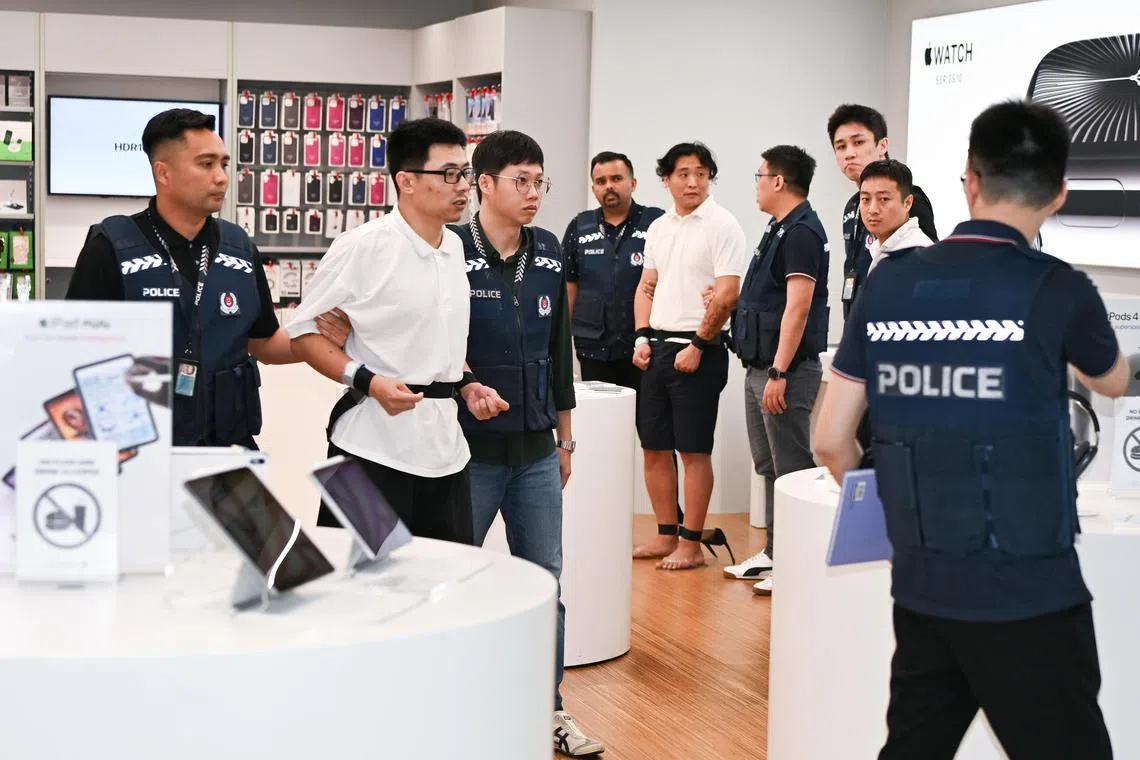Chinese, Malaysians, Russian among those wanted in fraud cases targeting Singapore retailers
Sign up now: Get ST's newsletters delivered to your inbox

Suspects (in white) in a fraud case being taken back to a retail store for investigations.
ST PHOTO: LIM YAOHUI
SINGAPORE – A number of cases involving foreigners coming to Singapore to commit credit card fraud has led to at least $300,000 getting lost so far.
And while the police were able to arrest nine suspects, they are looking for another 11 who managed to leave the country.
The police said on Nov 22 that there have been at least 178 reports since Oct 1 regarding fraudulent bank card transactions involving the purchasing of electronic products, luxury goods and attraction tickets.
The syndicates behind this kind of fraud are believed to have stolen credit card details of victims through a series of e-commerce phishing scams.
These details were then loaded onto a mobile app that can be controlled remotely and used for contactless payments.
The foreigners, who were recruited in their home countries via social messaging platforms, were told to enter Singapore and buy items such as expensive mobile phones, electronic accessories and gold bars using such contactless payments.
In a release on Nov 22, the police said they managed to identify at least 20 people believed to be involved in at least 94 of the reported cases.
Nine of them have been arrested and charged with cheating and forgery offences.
More than $30,000 in cash, four gold bars, a foreign-registered car and more than 30 iPhones and other mobile accessories were seized.
It was previously reported that five of the suspects were taken back to the retail stores for investigations
The five were identified as Chinese nationals Zhang Tianyu, 29, Xu Zhaochen, 36, and Li Xueqi, 36; and Malaysians Quek Jian Qing, 21, and Yong Huo Ying, 24.
The other four who were charged have since been identified as Malaysians Ding Jiun Hao, 25, Lim Wai Kiat, 24, and Nai Jin Khin, 35; and Chinese national Hong Zepeng, 30.
The police said the other 11 people they managed to identify left Singapore, and they are now engaging the assistance of foreign law enforcement agencies to obtain more information on them.
Among the 11 were Chinese nationals, Malaysians and a Russian man.
The Chinese nationals are Li Jianwen, Hu Gang, Zheng Dawei, Liao Wei Liang, Liu Dibiao, Yan Zhongzhe and Zhao Tao. The Malaysians are Liau Wei Zheng, Tang Chin Huat and Tsang Chee Liang.
The identified Russian is Sergei Sokov.
On Nov 22, the police presented seven retail staff members with Community Partnership Awards for their assistance in the cases.
The workers were from Best Denki, Courts and T2 Electronics.
Mr Tony Lim, 47, and Mr Dave Sim, 39, from the Best Denki outlet at Parkway Parade, described how one suspect tried to buy four iPhones while refusing to make eye contact with them.
Mr Sim, the store supervisor, found the man acting suspiciously and discreetly messaged Mr Lim, the store manager.
To keep the suspect there until Mr Lim arrived, Mr Sim declined the contactless transaction of more than $7,500 on the store’s end so that it would not go through.
Mr Lim turned up and asked the man trying to make the purchase to show his physical credit card, as it was a large and unusual transaction.
He said: “The customer just stood there mumbling to himself and looking around, then after a while he just kept quiet and stood there.”
The man left without the phones, and Mr Lim made a police report.
Police later identified the man as Quek Jian Qing, who has since been arrested and charged with cheating and disposal of stolen property.
In another case, a man walked into the Courts outlet at Funan wanting to buy six iPhones.
Mr Jason Neo, 47, a deputy store manager at the outlet, said the man first bought three of the phones using contactless payment before immediately asking to buy another three.
This raised the suspicion of the staff, who asked to see his passport.
“The man showed a digital copy of a passport with a Japanese name on his phone, but he spoke with a very strong Chinese accent,” Mr Neo said.
“I like reading a lot of news about scams and cheating cases, so I knew something was not right.”
He got a colleague to discreetly take pictures of the man, and processed the transactions so as not to alert the suspect.
Mr Neo gathered all the information he could, including the credit card details, the man’s signature and pictures, and quickly filed a police report once he left the store.
Because of this, the police were able to identify the suspect and two others, all of whom were Chinese nationals who were subsequently arrested.
Deputy Assistant Commissioner of Police (DAC) Wong Keng Hoe, the commander of Central Police Division, said the timely reporting and crucial information provided by these employees led to the identification and subsequent arrest of six of the suspects.
He said: “We encourage our retail partners to continue their vigilance and to help safeguard our communities from crime.
“The police would also like to remind members of the public to safeguard their bank card details and not to disclose sensitive banking information to anyone.”



